City guides


Dallas Fort Worth Travel Guide
The two biggest cities in North Texas, Dallas and Fort Worth, are 30 miles (48km) apart but have been brought together into one urban concentration known as the 'DFW Metroplex' with a combined population of more than four million. The two cities are, however, very different halves of a whole.
Dallas, its soaring glass-sided skyscrapers growing out of the prairie, is full of glitz and glamour. This thriving city is the ninth largest city in the United States, having grown from a frontier outpost with 20 streets in 1841 to a centre for big business and big banking. This was helped along a little by 'black gold', the oil that was discovered 100 miles (161km) east of the city in 1930.
Fort Worth, the western half of the Metroplex, is the gateway to the 'Wild West'. Having started out as 'Cowtown', a base for cattle drives, Fort Worth still reflects a laidback attitude, although surprisingly it has also developed into a cultural centre with world-class museums and a thriving performing arts sector.
Dallas is certainly the place for visitors to enjoy a rich shopping experience and upmarket wining and dining, but Fort Worth is the venue for exciting and interesting attractions and a taste of western culture.
Things to do in Dallas Fort Worth
Dallas is a huge and diverse city where visitors have no shortage of things to see and do. Downtown is home to many of the city's iconic museums, including the Dallas Museum of Art, the Old Red museum of Dallas County History and Culture, the Nasher Sculpture Center and the famous Sixth Floor Museum at Dealey Plaza.
The downtown area is also home to the Dallas World Aquarium and Steinway Hall. Several companies offer Segway tours of downtown Dallas, which can be a fun and informative way to explore the area. South Dallas is home to the State Fairgrounds, which are open year round, and the Dallas Zoo. Many famous attractions most associated with Dallas are actually located in the suburbs. Arlington is home to Six Flags Over Texas, Six Flags Hurricane Harbor, and the Rangers Ballpark.
Fort Worth is just as fascinating as its more famous counterpart, with a plethora of museums that include the National Cowgirl Museum, the Stockyards Museum, the Texas Cowboy Hall of Fame, the Amon Carter Museum, the Kimbell Art Museum and the CR Smith Aviation Museum.
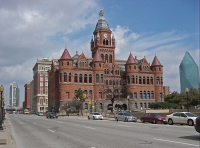
Dallas Heritage Village
Dallas Heritage Village is a living museum of 13 acres, preserving the area's rich history between 1840 and 1910. Visitors to Dallas can explore a working farm, discover elegant Victorian homes, and take in nearly 40 buildings, including a school, church, general store and saloon.There's even a bank alleged to have been robbed by the infamous Bonnie and Clyde. Visitors are also welcome to bring picnic lunches along and enjoy them on the park's lawns. The museum also hosts many events and programs, including lectures, fun workshops and scout days for boys and girls.
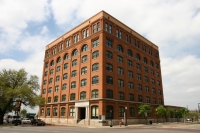
Sixth Floor Museum
The assassination of President John F. Kennedy is commemorated in the Sixth Floor Museum at Dealey Plaza where the 1963 shooting took place. Most chilling of the exhibits is the window area in the former Texas School Book Depository building from where sniper Lee Harvey Oswald allegedly fired the fatal shots at the 35th President's motorcade. The museum also documents Kennedy's life and legacy, featuring more than 20,000 artefacts and a large amount of archival material, recreating the social and political climate of 1963. A granite marker at the corner of Houston and Main Streets outside shows where Kennedy was assassinated and a memorial stands in nearby John F. Kennedy Plaza.
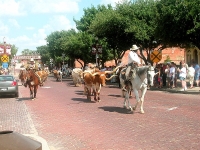
Fort Worth Stockyards
Fort Worth is the place to experience the romance of the Wild West, and the Stockyards National Historic District is the ideal starting point. It's packed with exciting attractions, including wild rodeos, country music gigs, and shops selling genuine cowboy gear. Hungry and thirsty patrons won't be disappointed by its saloons and Texan diners either. There's also Billy Bob's Honky Tonk, a giant country music club comprising an indoor rodeo, a massive dance floor and restaurants. Further attractions in the district include the Texas Cowboy Hall of Fame, the Fort Worth Stockyards Stables and the Stockyards Museum.
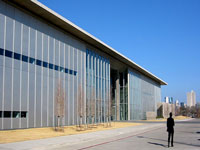
Modern Art Museum of Fort Worth
Fort Worth's Modern Art Museum is the oldest art museum in Texas. Its permanent collection of modern and contemporary paintings includes works by Picasso, Andy Warhol, Rauschenberg and Pollock, and is particularly strong on works in the pop and minimalist genres, as well as German art from the 70s and 80s. The museum also hosts visiting exhibitions and features a large sculpture collection. Altogether, the permanent collections on display amount to 3,000 works. The building has 53,000 square feet of gallery space and a state-of-the-art auditorium regularly hosting performances and shows.
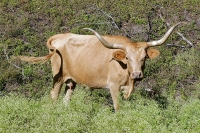
Cattle Raisers Museum
Located in the Fort Worth Museum of Science and History, the Cattle Raisers Museum is dedicated to telling the story of the cowboy and ranching industry. Interactive exhibits, authentic artefacts and theatre presentations bring the legends and lore of the Wild West life, from the famed Texas Rangers to daring cattle rustlers. This museum in Fort Worth covers four broad eras in the cattle industry, starting from 1850 until the present day, along with housing the largest collection of branding irons in the world.
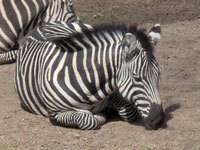
Fort Worth Zoo
After humble beginnings, Fort Worth Zoo has come to rank as one of the best in the United States. More than 5,000 animals live in enclosures around the zoo, reflecting their natural habitats. African lions lounge, Asian elephants trumpet and stunning white tigers sit resplendent in their snowy coats. Striking Sumatran orangutans perch in their trees as the imperious Komodo Dragon transfixes onlookers. The zoo also boasts loads of reptiles, amphibians and birds, along with its fair share of marine life and creepy crawlies. Along with a petting corral, the zoo also partakes in conservation programs and educational entertainment, such as its Outdoor Learning Theater.
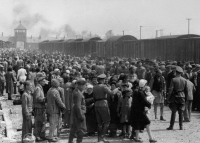
Dallas Holocaust Museum
The Dallas Holocaust and Human Rights Museum is a non-profit organisation dedicated to memorialising the Holocaust and its victims, as well as covering the history and continued struggle for human rights. It is widely acclaimed for its creative programs, internationally celebrated exhibits and world-class speakers. The museum provides guided tours for groups, audio tours for individuals and public lectures, and even contains digitised testimony from survivors of genocides throughout the world. There's a strong focus on education, with it welcoming hundreds of school trips each year, while its West End location means loads of award-winning pubs and restaurants are nearby.
Six Flags Over Texas
Six Flags Over Texas has been a consistently popular family attraction for over 50 years, sitting midway between Dallas and Fort Worth. There's truly something for everyone, from thrilling coasters to gentle rides for the little ones. Six Flags Over Texas stages events and festivals throughout the year, such as Labor Day Weekend and Fathers Day Weekend. Across the road in summer sits Hurricane Harbor, a perfect antidote to those hot summer days. It's the largest waterpark in northern Texas, with numerous slides and pools. With over a million annual visitors, Six Flags Over Texas has earned its reputation as one of the premier theme parks in America and visitors to Fort Worth would be ill-advised to miss it, especially those travelling with kids in tow.
Getting Around
Public transport in the Dallas-Fort Worth metroplex is served by the Dallas Area Rapid Transit agency. It is responsible for the cities' light rail, buses, and railways, with the Trinity Railway Express acting as an express line between Dallas and Fort Worth. Ride-sharing apps such as Lyft and Uber are also in operation.
Dallas Fort Worth Climate and Weather
The weather in the Dallas-Fort Worth Metroplex is generally warm throughout the year, with high temperatures of up to 67F (19C) possible even in the midst of winter. Temperatures in January, however, usually average at cool but mild, with 37F (3C) lows. Snow falls roughly one to two days per winter (December to February), although freezing rain is more common.
Springtime in Dallas is lovely with mild temperatures and wildflowers in bloom; however, the weather can be volatile with severe thunderstorms, hail and occasional tornadoes. Summers (June to August) can be extremely hot and humid with average highs of 97F (36C), and hot, dry winds blowing in from the north and west. The northern region of Texas is among the hottest in the US during the summer months.
United States of America travel info
Electricity
The electrical current is 120 volts, 60Hz. Plugs are mainly the type with two flat pins, though three-pin plugs (two flat parallel pins and a rounded pin) are also widely used. European appliances without dual-voltage capabilities will require an adapter.
Language
English is the most common language spoken but Spanish is often heard in the south-western states.
Money
The official currency is the US Dollar (USD), which is divided into 100 cents. Only major banks exchange foreign currency. ATMs are widespread and credit cards are widely accepted; Apple Pay and Google Pay are very popular. Banking hours are Monday to Friday 9am to 3pm.
Tipping
A 15 percent tip is expected by taxi drivers, bartenders, hairdressers and waiters, but travellers shouldn't tip in fast-food or self-service restaurants. In expensive restaurants or for large parties, the tip should be 20 percent of the bill. It's normal to tip staff such as valets and porters in hotels; this is discretionary, although a minimum of $5 is expected. Most services are customarily tipped if the service is good.
Health
There are no specific health risks associated with travel within the USA. Medical facilities are excellent, but expensive. Only emergencies are treated without prior payment and treatment can be refused without evidence of insurance or proof of funds. Good medical insurance is essential.
Safety
Travel within the United States is generally trouble-free, though travellers should be aware that the US shares with the rest of the world an increased threat from terrorist incidents. Security has been heightened, particularly at airports. Restrictions on hand luggage apply and travellers are advised to check on the latest situation with airlines in advance. Travellers should also be alert to the dangers of car and street crime in cities and should use common sense and take basic precautions. Hurricanes are common between June and November, putting the southern USA, including the Gulf Coast and the eastern US at risk. There's a risk of wildfires in many dry areas in the US, particularly on the West Coast from March to November.
Local customs
Laws vary from state to state, including speed limit, fines and punishment. The age at which alcohol may be legally bought and consumed is 21 years.
Doing business
In such a large country, filled with so many diverse groups, business practices may differ according to each state, though rarely to any large degree. The East Coast is traditionally more formal than the West Coast, though in states such as California, dress code and conservative appearance are as common as they would be in New York. Punctuality is important throughout the country and it's considered rude to be late for a meeting. Gift-giving is uncommon as it may be construed as bribery. Appropriate titles (Mr, Mrs, Ms) are used upon introduction and until otherwise stated. Americans favour politeness and greetings of 'Hello' and 'How are you?' are often expressed with sincerity. Business hours may vary in each state, but an 8am start and 5pm finish Monday to Friday is the most common with an hour over lunch.
Status and age are not necessarily indicative of seniority, nor do they carry much weight in themselves. Those doing business in the States should be mindful of this fact; foreigners should never make assumptions about someone's position or rank. Best practice is to be respectful to all parties. That said, the US upholds a hierarchal business structure in which 'the boss' is the ultimate decision-maker. Senior leaders have the power of the last word, and can go against the grain just as easily as they can follow popular opinion. Foreigners should concentrate on winning over this individual, even if the greater group seems unsupportive. Americans value a direct style of communication. In this fast-paced, consumer culture 'time is money', and small-talk is viewed as unnecessary and wasteful. It's best for foreigners to get to the point quickly, speak about issues in a frank and open manner, and to avoid taking offence if someone questions or challenges them outright.
Duty free
Travellers to the United States who are returning residents of the country do not have to pay duty on articles purchased abroad to the value of $800 provided their stay was longer than 48 hours and their duty-free allowance was not used in the 30-day period prior. For passengers arriving from Samoa, Guam and the U.S. Virgin Islands, a duty-free allowance of $1,600 is allowed. The following items are included in this: 50 cigarettes and 10 cigars and 150 millilitres (5 fl. oz.) of alcoholic beverages or 150 millilitres (5 fl. oz.) of perfume containing alcohol. Restrictions may apply to goods from Cuba, Iran, North Korea, Burma (Myanmar), Angola, Liberia and Sudan. It is prohibited to import Cuban cigars from any country.
Travellers to the United States who are non-residents do not have to pay duty on the following items: 50 cigars or 200 cigarettes and gifts to the value of $100 provided their stay in the USA is not less than 72 hours and that the allowance has not been used in the preceding six-month period.
Prohibited items for residents and non-residents include meat or meat products, poultry, narcotics, absinthe, plants, seeds, vegetables, fruits, soil, live insects and other living plants or animal pests. Fish is prohibited unless it carries disease-free certification. Wildlife and animals or their by-products carry restrictions. Dairy products and eggs from specified countries are not allowed. Firearms and ammunition are not allowed without the necessary license and permit.
Communications
The international country dialling code for the United States is +1. Mobile networks cover most of the country, especially all urban areas; travellers can purchase local prepaid SIM cards for unlocked phones or use eSIMs if their cellular providers support it on their networks. WiFi is widely available.
Passport & Visa
It is highly recommended that travellers' passports have at least six months' validity remaining after the intended date of departure from them travel destination. A visa is required for short visits unless travellers qualify for entry under the Visa Waiver Program.
The Visa Waiver Program (VWP) enables citizens of certain countries to travel to the US for a stay of up to 90 days without a visa. Visitors under the VWP need a valid Electronic System for Travel Authorization (ESTA), which allows the US government to screen all visitors before travel. Visitors entering the country under the VWP must have a machine-readable passport (MRP) that has a barcode on the photo page. Travellers under the VWP must have passports that include biometrics if they wish to enter the country without a visa, which means that passports must contain unique personal data such as fingerprints or iris details. All passports must contain a digital photo image in order to travel visa-free. All visitors to the USA have a photograph and two fingerprints taken by an inkless scanner on arrival, including those travelling visa-free under the VWP.
As part of the Western Hemisphere Travel Initiative (WHTI), all travellers travelling between the United States and Canada, Mexico, Bermuda, and the Caribbean region are required to present a passport or other valid travel document to enter or re-enter the United States. If departing from the USA, a valid passport is required by immigration authorities. Immigration officials often apply different rules to those stated by travel agents and official sources.
Entry requirements
US citizens require passports.
UK nationals require a passport valid for duration of stay. Most passport holders can get an Electronic System for Travel Authorisation (ESTA) through the Visa Waiver Programme, which allows travel to the US for up to 90 days. The VWP includes tourism, certain types of business visit and transit to another country.
The most important requirement on entering the U.S. is providing proof of Canadian citizenship. A valid Canadian passport is the best document to prove Canadian citizenship and the right to return to Canada. However, several other documents can serve, depending on the mode of transport. Generally, Canadian citizens do not require visitor, business, transit or other visas to enter the United States from Canada, though there are some exceptions.
Passports must be valid for the period of intended stay. If visiting the US for fewer than 90 days, Australian nationals may be eligible to apply for an Electronic System for Travel Authorization (ESTA), and enter under the Visa Waiver Program (VWP).
South Africans must hold a passport valid for duration of stay. A visa is required.
Passports must be valid for duration of stay. Irish nationals can get an Electronic System for Travel Authorisation (ESTA) under the Visa Waiver Programme for entry into the United States.
Passports must be valid for duration of stay. New Zealand nationals can get an Electronic System for Travel Authorisation (ESTA) under the Visa Waiver Programme for entry into the United States.
Useful contacts
United States Tourist Office: www.usatourist.com
911 (General)Embassies / consulates in other countries
United States Embassy, London, United Kingdom: +44 20 7499 9000.
United States Embassy, Ottawa, Canada: +1 613 688 5335.
United States Embassy, Canberra, Australia: +61 2 6214 5600.
United States Embassy, Pretoria, South Africa: +27 12 431 4000.
United States Embassy, Dublin, Ireland: +353 1 668 8777.
United States Embassy, Wellington, New Zealand: +64 4 462 6000.
Embassies / consulates in United States of America
British Embassy, Washington DC: +1 202 588 6500.
Canadian Embassy, Washington DC: +1 202 682 1740.
Australian Embassy, Washington DC: +1 202 797 3000.
South African Embassy, Washington DC: +1 202 232 4400.
Irish Embassy, Washington DC: +1 202 462 3939.
New Zealand Embassy, Washington DC: +1 202 328 4800.


